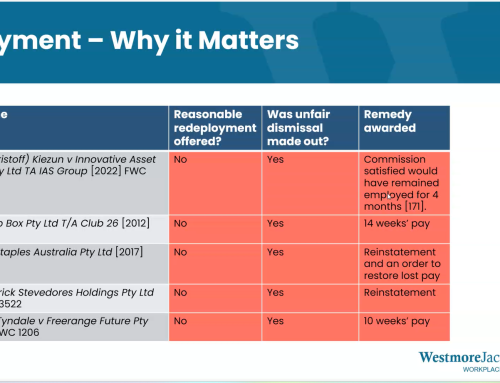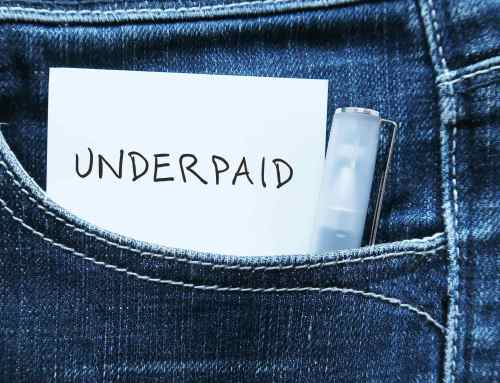Celebrity chef and former Masterchef judge George Calombaris has been engulfed in criticism recently.
The scale of underpayments made by restaurants associated with him and the nature of regulatory action taken against those restaurants by the Fair Work Ombudsman (“FWO”) has re-ignited demands for new ‘wage theft’ laws to address non-compliance with Australia’s workplace laws.
This article discusses the underpayment which is the subject of the Calombaris case, and the proposed criminalisation of ‘wage theft’ by both federal and Victorian governments. It also discusses the lessons employers can learn from this high-profile underpayment and the FWO’s response to it.
Anatomy of an underpayment
This article concerns the underpayment of a number of employees employed by various restaurants which form part of George Calombaris’ MAdE Group (“the Group”) and certain Jimmy Grants restaurants.
In 2017 the Group notified the FWO it had identified contraventions of the Fair Work Act 2009 (Cth) (“FW Act”) within the Group. These contraventions occurred between 2011 to 2017.
Prior to notifying the FWO, the Group took various steps to rectify its contraventions. These included commissioning an external audit, improving its HR functions and systems, and back-paying its employees.
The Group underpaid 524 employees over $7.8 million. These underpayments included a failure to pay (in accordance with the relevant award) the correct:
- minimum rates of pay;
- casual loading;
- penalty rates; and
- overtime rates.
The Group also contravened other provisions of the relevant Award, including its obligation to record certain employees’ start and finish times.
The enforceable undertaking
After reporting its contraventions to the FWO, the Group entered into an enforceable undertaking with the FWO.
An enforceable undertaking is, in effect, a written agreement between the FWO and an employer. The employer agrees to do certain things to rectify its contraventions of the FW Act and to ensure those contraventions do not happen again. In exchange, the FWO agrees to not prosecute the employer in court.
Under its enforceable undertaking with the FWO, the Group is required (amongst other things) to:
- subscribe to receive the FWO’s email updates regarding (amongst other things) employee entitlements;
- implement systems and processes to monitor its compliance with workplace laws, and inform the FWO of these systems and processes;
- provide compliance training to certain employees;
- perform a number of external audits over the next 3 years;
- cooperate with the FWO regarding any future allegations of non-compliance with the FW Act;
- publish a written public apology in weekend newspapers, hospitality industry media, and on its website and social media accounts; and
- make a contrition payment of $200,000 to the Commonwealth.
Additionally, Calombaris is required to participate in a number of speaking engagements at hospitality industry events. At these engagements Calombaris must communicate the importance of complying with workplace laws and the consequences for failing to do so. These must be delivered in Calombaris’ “usual language and style”.
The undertaking does not prevent another person (for example, an employee) from issuing proceedings against the Group regarding the underpayments.
A “light” punishment?
The enforceable undertaking has received widespread criticism. Some have argued the $200,000 contrition payment inadequately punishes the Group and Calombaris for the underpayments, particularly given the size of the underpayments.
For example, the Australian Council of Trade Unions dismissed the undertaking as a “poultry fine Many of the Group’s contraventions occurred after the FWO had alerted one of the Group’s entities to possible non-compliance with the relevant award in 2015. Following that notification, Calombaris sent the FWO a letter stating the entity would rectify its non-compliance. However, the entity did not do so. This fact may have led a court to order larger penalties than $200,000 against the Group had the FWO prosecuted the Group in court. The enforceable undertaking helped rekindle public discussion regarding whether the FW Act is being adequately enforced. The introduction of increased penalties for ‘serious contraventions’ of the FW Act in 2017 does not appear to have satisfied the demand for harsher enforcement of workplace laws. A federal wage theft law? Following the public attention to this case, the Prime Minister announced the federal government was currently drafting laws which would criminalise “worker exploitation”. If introduced, these laws will likely impose criminal sanctions (including jail sentences) for intentional or repeated contraventions of workplace laws. The proposed laws are unlikely to criminalise “honest mistake[s] [which are] promptly corrected”. The government is yet to provide details regarding its proposed legislation. However, it has committed to consult with unions and employers regarding the proposed laws over the coming months. A Victorian wage theft law? Last year, the Victorian government announced its intentions to criminalise wage theft. Whilst the Victorian government has not yet released any draft legislation, it appears the Victorian government’s plan would involve imposing criminal penalties for: These offences would likely carry penalties of up to 10 years’ jail, and/or fines of up to $190,284 for individuals and $951,420 for companies. Following the Calombaris case and the announcement of a federal wage theft law, the Victorian government appears to remain committed to continuing with its own wage theft law. How a federal wage theft law would interact with the proposed Victorian law is unclear. The existence of a federal wage theft law could exacerbate the possible constitutional issues with the proposed Victorian law. Lessons for employers The Calombaris case presents a number of lessons to employers who, for one reason or another, have failed to comply with the FW Act. In particular, it reminds employers: These lessons are discussed in greater detail below. It can be wise to cooperate with the Fair Work Ombudsman The enforceable undertaking discussed above demonstrates the benefits of cooperating the FWO. Employers who readily cooperate with the FWO to correct an underpayment may receive a more lenient outcome than employers who are difficult with the FWO. The Group self-reported its contraventions. It quickly identified and rectified its contraventions and subsequently cooperated with the FWO. This may have influenced the FWO to take more lenient action against the Group. Early cooperation and pro-active rectification of underpayments is a factor courts may take into account when assessing the quantum of penalties to award against an employer who has contravened the FW Act. A court may award higher penalties for FW Act contraventions against employers who are uncooperative with employees who seek rectification of underpayments. The Fair Work Ombudsman does not exist only to punish employers One of the FWO’s main functions is to “promote compliance with the FW Act”. Calombaris’ case reminds us that the FWO has to balance various priorities in performing this function. Punishing employers is not the only means by which the FWO can promote compliance with the FW Act. The FW Act says that promoting compliance with the FW Act “include[es] providing education to employees, employers…and organisations”. Here, the FWO may have decided that prosecuting the Group in court in pursuit of large penalties was not the best means of promoting compliance with the FW Act. Rather the FWO may have decided that using Calombaris’ high profile to educate employers about the dangers of underpayments is a more effective means of promoting compliance with the FW Act. Legal liability is not the only possible consequence for underpaying employees Another lesson from this high-profile underpayment is that legal liability is not the only consequence a business can suffer if it fails to comply with the FW Act. Businesses (and the individuals involved in them) can suffer substantial reputational damage. Calombaris and his restaurants have been widely condemned following reporting of the scale of the underpayments. Reputational damage for underpaying employees is not reserved for celebrity chefs. Underpayment commonly feature in the news media. Even (comparatively) small cafes run the risk of being accused of underpaying its employees in the news media. Employers should get advice from an employment lawyer if they are unsure whether they are complying with relevant workplace laws. Employers who identify underpayments should seek legal advice as soon as possible. Adam Colquhoun Principal This article is general information only. It is not legal advice. If you need legal advice, please contact us.






